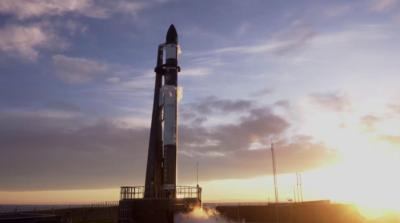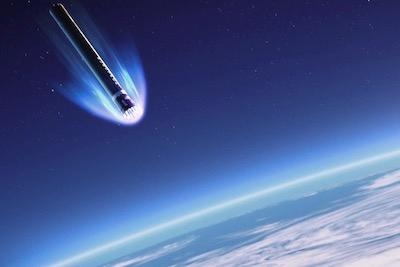Sat, Oct 23, 2021
Competes with SpaceX Multiuse Falcon
Rocket Lab has revealed its newest efforts refining its Electron rocket’s first stage recovery and reusability processes, during their next satellite delivery launch. After delivery of the second stage and payload towards its target, the first stage will complete a controlled descent, aided by parachutes, to a splashdown point in the ocean. On

ce there, their Ocean Recovery and Capture Apparatus (ORCA) system will retrieve the rocket and store it in its cradle for inspection and return to service. Their eventual goal is to capture a returning rocket mid-flight during its descent.
During the next launch, referred to as the “Love At First Insight” mission, Rocket Lab will deliver two Earth-observation satellites for global monitoring company BlackSky, sometime after November 11. The continued refinement of the Electron system is hoped to create a more robust, reusable, and reliable rocket with lower maintenance requirements after each successful mission. Changes to their operations will include closer chase helicopters to scout the touchdown point and begin recovery faster, with the rocket receiving improved heat shielding and a higher-deploying parachute system to provide a slower, longer descent. The data received will be analyzed for future aerial recovery efforts.

“As one of only two companies to recover an orbital-class booster from space, we’ve proven it’s possible to make Electron the world’s first orbital-class reusable small launch vehicle,” said Peter Beck, Rocket Lab founder and CEO. “We’ve perfected Electron’s controlled descent, demonstrated flawless parachute deployment, and successfully plucked stages from the ocean. Now we’re gearing up for the next stage – preparing to use a helicopter to catch a rocket as it descends to Earth from space. It’s ambitious, but with each recovery mission we’ve iterated and refined the hardware and processes to make the impossible ordinary. I’m excited to take what we learn from this launch and put it into practice with aerial capture missions in future.”
More News
Airport Marking Aids Markings used on runway and taxiway surfaces to identify a specific runway, a runway threshold, a centerline, a hold line, etc. A runway should be marked in ac>[...]
"It is extremely difficult, if not impossible, for manned aircraft to see a drone while conducting crop-enhancing and other aerial applications at low altitudes and high speeds. We>[...]
Aero Linx: The Skyhawk Association The Skyhawk Association is a non-profit organization founded by former Skyhawk Pilots which is open to anyone with an affinity for the A-4 Skyhaw>[...]
“The T-54A benefits from an active Beechcraft King Air assembly line in Wichita, Kansas, where all required METS avionics and interior modifications are installed on the line>[...]
Aero Linx: Aerostar Owners Association The Association offers the Aerostar Owner a unique opportunity to tap an invaluable source of information concerning the care and feeding of >[...]
 ANN's Daily Aero-Term (04.28.24): Airport Marking Aids
ANN's Daily Aero-Term (04.28.24): Airport Marking Aids Aero-News: Quote of the Day (04.28.24)
Aero-News: Quote of the Day (04.28.24) ANN's Daily Aero-Linx (04.28.24)
ANN's Daily Aero-Linx (04.28.24) Aero-News: Quote of the Day (04.29.24)
Aero-News: Quote of the Day (04.29.24) ANN's Daily Aero-Linx (04.29.24)
ANN's Daily Aero-Linx (04.29.24)




